Increasing Destruction of Hurricanes: The Influence of Climate Change on Helene and Milton

Recent hurricanes, Helene and Milton, exemplify the alarming trend of increased hurricane intensity due to climate change. Scientific studies indicate that while climate change does not cause these storms, it significantly contributes to their destructiveness through warmer oceans and rising sea levels. Helene caused unprecedented rainfall resulting in fatalities and damages, while Milton demonstrated rapid intensification. The non-linear effects of climate change could lead to dire consequences for infrastructure and insurance markets, highlighting the urgent need for attention and action.
In recent months, Hurricanes Helene and Milton have highlighted the alarming trend of rapidly intensifying storms exacerbated by climate change. Following the devastation of Hurricane Harvey in 2017, scientists recognized that climate change significantly worsened rainfall due to pollution. New studies reveal that the impacts on Helene and Milton align with this trend, illustrating that though climate change does not instigate hurricane formation, it does enhance their destructiveness through various factors. Current research indicates that warmer ocean temperatures, elevated air temperatures, and rising sea levels are influencing four critical aspects of hurricanes: increased winds and rainfall, accelerated storm intensification, and heightened storm surge. For instance, Hurricane Helene produced catastrophic rainfall, particularly in the mountainous regions of Western North Carolina, dropping over 40 trillion gallons of water and resulting in significant fatalities and property damage. Analysis by various scientific teams underscored that climate change increased the rainfall by approximately 10% in critical regions, making extreme rainfall events more likely in the future. Similarly, Hurricane Milton achieved a rapid intensification to Category 5 before weakening to Category 3 upon landfall, causing at least 33 deaths and substantial property damage. Climate models suggested that climate change contributed to the increased intensity of Milton, demonstrating a 40% increase in storm occurrence with similar intensity and a 10% increase in wind speeds. Furthermore, climate experts warn about the non-linear impacts of climate change on hurricane destructiveness, where slight changes in climate can lead to abrupt and extreme consequences for vulnerable infrastructures and communities. This volatility poses significant challenges, including potential increases in insurance costs and the possibility of insurance providers withdrawing from high-risk markets. With the growing intensity and frequency of storms driven by climate change, the implications for society remain grave, underscoring the urgent need for climate action and preparedness.
The phenomenon of hurricanes intensifying due to climate change has become an area of significant concern for scientists and disaster forecasters alike. Evidence shows that while the incidence of hurricanes is not directly caused by climate change, the severity and destructiveness of these storms have been markedly influenced by rising temperatures associated with human activities. Studies have established a correlation between elevated ocean and air temperatures, increased sea levels, and heightened storm characteristics, necessitating ongoing research into the impacts of climate alterations on hurricane behavior.
The analysis of Hurricanes Helene and Milton has elucidated the critical influence of climate change on hurricane dynamics, underscoring that while hurricane formation itself is not a direct consequence of global warming, the resulting storms are becoming increasingly severe and destructive. A better understanding of these developments is crucial for initiating effective climate policies and disaster preparedness measures. Failure to acknowledge the implications of climate change could lead communities to face unprecedented disaster scenarios, necessitating a robust response in both urban planning and emergency management protocols.
Original Source: texasclimatenews.org







